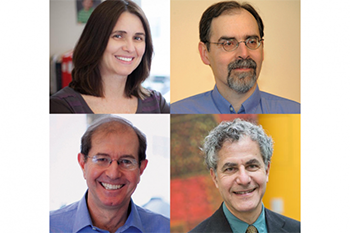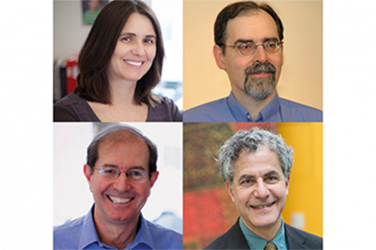
Clockwise from top left: Goldwasser, Lozano-Pérez, Sipser, Micali.
Adam Conner-Simons | CSAIL; Julie Keller | School of Science
Honorees included three EECS professors affiliated with the Computer Science and Artificial Intelligence Laboratory (CSAIL) -- Shafi Goldwasser, Tomás Lozano-Pérez, and Silvio Micali -- along with School of Science Dean Michael Sipser.
The professors were among fewer than 1 percent of ACM members to receive the distinction. Fellows are named for contributions spanning such disciplines as graphics, vision, software design, algorithms, and theory.
“Shafi, Tomás, Silvio, and Michael are very esteemed colleagues and friends, and I’m so happy to see that their contributions have recognized with ACM’s most prestigious member grade,” said CSAIL Director Daniela Rus, who herself was named an ACM Fellow in 2014. “All of us at MIT are very proud of them for receiving this distinguished honor.”
Goldwasser was selected for “transformative work that laid the complexity-theoretic foundations for the science of cryptography.” This work has helped spur entire subfields of computer science, including zero-knowledge proofs, cryptographic theory, and probabilistically checkable proofs. In 2012 she received ACM’s Turing Award, often referred to as “the Nobel Prize of computing.”
Lozano-Pérez was recognized for “contributions to robotics, and motion planning, geometric algorithms, and their applications.” His current work focuses on integrating task, motion, and decision planning for robotic manipulation. He was a recipient of the 2011 IEEE Robotics Pioneer Award, and is also a 2014 MacVicar Fellow and a fellow of the Association for the Advancement of Artificial Intelligence (AAAI) and of the IEEE.
Like Goldwasser, Micali was also honored for his work in cryptography and complexity theory, including his pioneering of new methods for the efficient verification of mathematical proofs. His work has had a major impact on how computer scientists understand concepts like randomness and privacy. Current interests include zero-knowledge proofs, secure protocols, and pseudorandom generation. He has also received the Turing Award, the Goedel prize in theoretical computer science, and the RSA prize in cryptography.
Sipser, the Donner Professor of Mathematics, was recognized for “contributions to computational complexity, particularly randomized computation and circuit complexity.” With collaborators at Carnegie Mellon University, Sipser introduced the method of probabilistic restriction for proving super-polynomial lower bounds on circuit complexity, and this result was later improved by others to be an exponential lower bound. He is a fellow of the American Academy of Arts and Sciences and the American Mathematical Society, and a 2016 MacVicar Fellow. He is also the author of the widely used textbook, "Introduction to the Theory of Computation."
ACM will formally recognize the fellows at its annual awards banquet on Saturday, June 23, 2018, in San Francisco.
For related information, visit the MIT News website. For complete information on this year's fellows and other awards programs, visit the ACM website.
Date Posted:
Labs:
Card Title Color:
Card Description:
Photo:

Card Wide Image:
